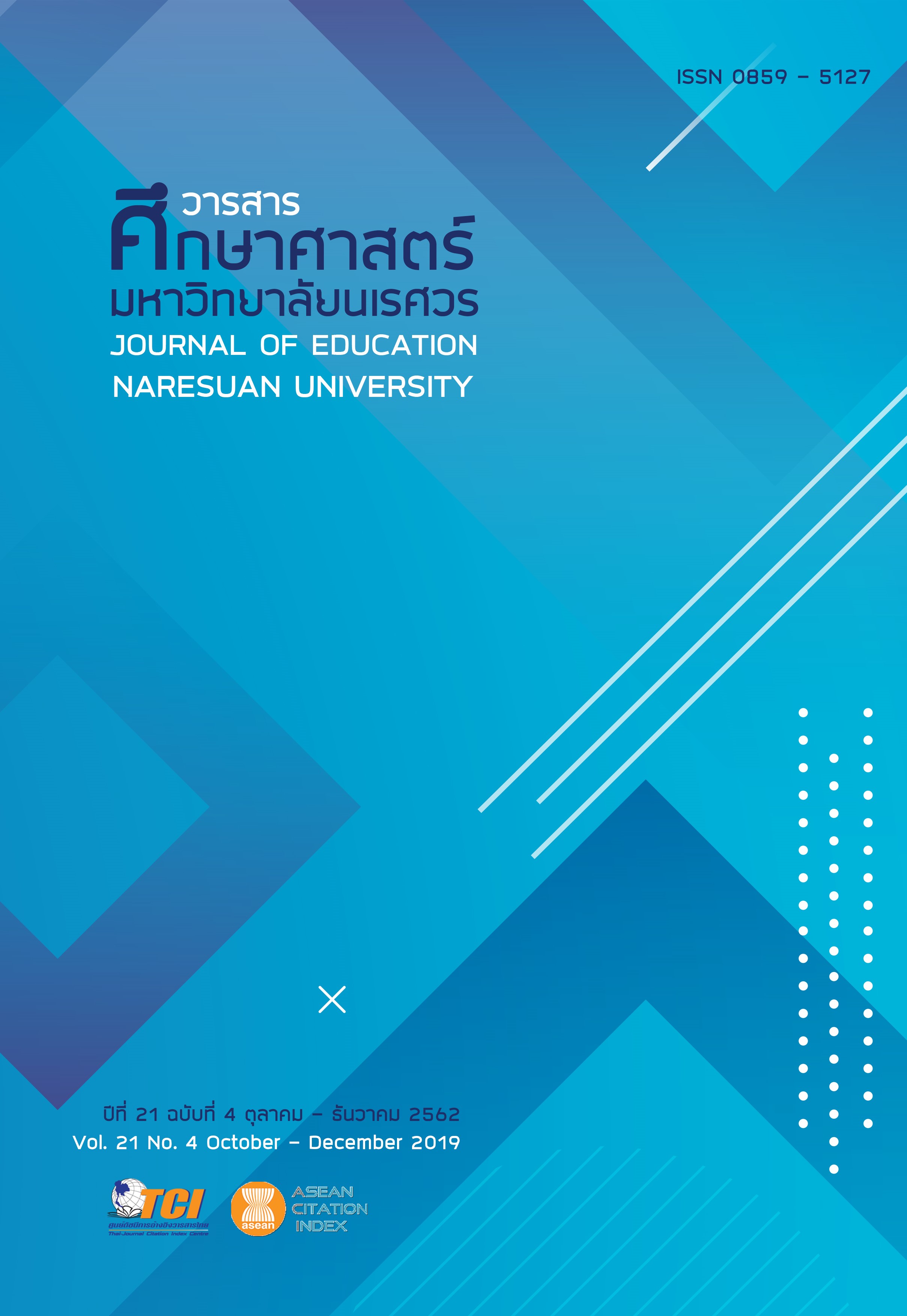ผลการจัดการเรียนรู้โดยใช้วิธีการแบบเปิดร่วมกับรูปแบบ SSCS ที่มีต่อความสามารถในการแก้ปัญหาและความสามารถในการเชื่อมโยงทางคณิตศาสตร์ ของนักเรียนชั้นมัธยมศึกษาปีที่ 2 (THE EFFECTS OF LEARNING MANAGEMENT BY USING OPEN APPROACH WITH SSCS ON MATHEMATICAL PROBLEM SOLVING AND CONNECTION ABILITY OF MATHAYOMSUKSA II STUDENTS)
Main Article Content
Abstract
การวิจัยครั้งนี้มีวัตถุประสงค์เพื่อเปรียบเทียบความสามารถในการแก้ปัญหาและความสามารถในการเชื่อมโยงทางคณิตศาสตร์หลังได้รับการจัดการเรียนรู้โดยใช้วิธีการแบบเปิดร่วมกับรูปแบบ SSCS กับเกณฑ์ร้อยละ 70 กลุ่มตัวอย่างเป็นนักเรียนชั้นมัธยมศึกษาปีที่ 2/4 โรงเรียนบ้านสวน (จั่นอนุสรณ์) จังหวัดชลบุรี ภาคเรียนที่ 2 ปีการศึกษา 2559 จำนวน 45 คน ซึ่งได้มาจากการสุ่มแบบกลุ่ม (Cluster random sampling) เครื่องมือที่ใช้ในการวิจัย ได้แก่ แผนการจัดการเรียนรู้โดยใช้วิธีการแบบเปิดร่วมกับรูปแบบ SSCS และแบบวัดความสามารถในการแก้ปัญหาและความสามารถในการเชื่อมโยงทางคณิตศาสตร์ สถิติที่ใช้ในการวิเคราะห์ข้อมูล ได้แก่ ร้อยละ ค่าเฉลี่ย ส่วนเบี่ยงเบนมาตรฐาน และการทดสอบที (t – test for one sample) ผลการวิจัย พบว่า ความสามารถในการแก้ปัญหาและความสามารถในการเชื่อมโยงทางคณิตศาสตร์ของนักเรียนหลังได้รับการจัดการเรียนรู้โดยใช้วิธีการแบบเปิดร่วมกับรูปแบบ SSCS สูงกว่าเกณฑ์ร้อยละ 70 อย่างมีนัยสำคัญทางสถิติที่ระดับ .01
THE EFFECTS OF LEARNING MANAGEMENT BY USING OPEN APPROACH WITH SSCS ON MATHEMATICAL PROBLEM SOLVING AND CONNECTION ABILITY OF MATHAYOMSUKSA II STUDENTS
The purpose of this research was to compare the mathematical problems solving and connecting ability after obtaining learning management by using Open Approach with SSCS model with criterion at 70 percent. The sample was 45 students who studied in Mattayomsuksa 2 in the second semester of 2016 academic year at Bansuan Jananusorn School, Chonburi Province and were selected by using cluster random sampling. The research instruments were lesson plans, a problem solving and connecting ability tests. The data were analyzed by using percentage, means, standard deviation and t – test for one sample. The result of research was the mathematics problems solving and connecting ability of the students after obtaining learning management by using Open Approach with SSCS model was significantly higher than the 70 percent criterion at the .01 level of significance.
Article Details
The owner of the article does not copy or violate any of its copyright. If any copyright infringement occurs or prosecution, in any case, the Editorial Board is not involved in all the rights to the owner of the article to be performed.
References
2. Chiappetta, E. L., & Russell, J. M. (1982). The relationship among logical thinking, problem solving instruction, and knowledge and application on earth science subject matter. Science Education, 66(1), 85-93.
3. Educational Technique Department. (2002). A handbook of mathematical learning management. Bangkok: Express Transportation Organization of Thailand. [in Thai]
4. Inprasitha, M., et al. (2009). Construction of lesson plan in mathematics. Khon Kaen: Center for Research in Mathematics Education, Khon Kaen University. [in Thai]
5. Inprasitha, M. (2011). One feature of adaptive lesson study in Thailand: designing a learning unit. Journal pf Science and Mathematics Education in Southeast Asia, 34(1), 47-66
6. Jaijan, W. (2012). Students’ mathematical connections in mathematics classroom emphasized on problem solving. KKU Res J (GS), 12(2), 116-127. [in Thai]
7. Kanchanakirati, W. (2011). Learning mathematics. Phetchaburi: Math and computer science Faculty of Science and Technology Phetchaburi Rajabhat University. [in Thai]
8. Makanong, A. (2013). “Unit 10: Learning activities in mathematics using skills and mathematical processes” resource essence and mathematical methods. Nonthaburi: Sukhothai Thammathirat Open University. [in Thai]
9. Naiyapat, O. (2008). Quantitative and qualitative research methods in behavioral and social sciences (3rd ed.). Bangkok: Samlada Printing. [in Thai]
10. Nohda, N. (2000). Teaching by open-approach method in Japanese mathematics classroom. In T. Nakahara, & M. 11. Koyama (Eds.), Pro-ceedings 24th of the Conference of the International Group for the Psychology of Mathematics Education, 1, 39-53.
12. Nowyenphon, P. (2013). “Unit 9 mathematical problem solving” resource essence and mathematical methods. Nonthaburi: Sukhothai Thammathirat Open University. [in Thai]
13. Patamawipati, S. (2014). Mathematical literacy assessment of PISA 2015. IPST Magazine, 42(188), 35-39. [in Thai]
14. Pizzini, E. L., Shepardson, D. P., & Abell, S. K. (1989). A rationale for and the development of a problem solving model of instruction in science education. Science Education, 73(5), 523-534.
15. Samaiyoo, S. (2011). The effects of organizing SSCB model on mathematical problem solving and communication abilities of mathayomsuksa II students on "The application of linear equations in one variable (Master thesis). Bangkok: Srinakharinwirot University. [in Thai]
16. Samranwong, N., Jenjit, A., & Nualpang, K. (2017). Learning management by SSCS model for developing mathematics problems solving ability and mathematics learning achievement of pratomsuksa 5 student. Journal of Education Naresuan University, 19(1), 254-264. [in Thai]
17. Suttiamporn, V. (2015). Mathematical activity emphasized on connection among knowledge ang ideas for fostering students’ creativity. Journal of Education Naresuan University, 17(4), 93-104. [in Thai]
18. The Institute for the Promotion of Teaching Science and Technology (IPST). (2012). Mathematical skills and processes. Bangkok: 3-Q Media. [in Thai]
19. The Institute for the Promotion of Teaching Science and Technology (IPST). (2014). PISA 2012 assessment, mathematics, reading and science results what does the student know and what can be do. Bangkok: Arun printing. [in Thai]
20. The Ministry of Education. (2009). The basic education core curriculum 2008. Bangkok: The Agricultural Co-operative Federation of Thailand Printing. [in Thai]


